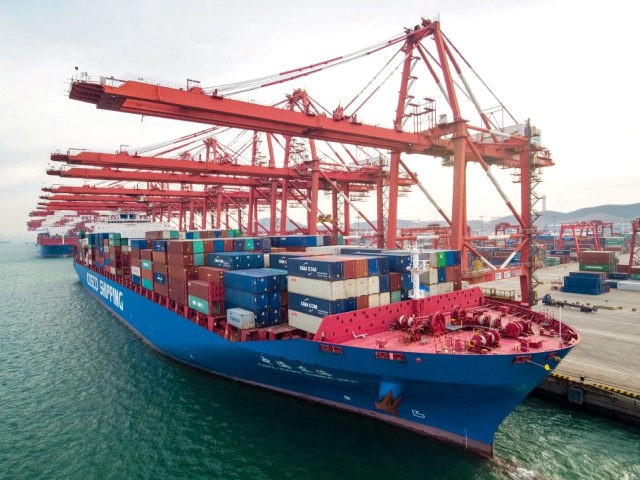Communist China partly shut down one of the world’s busiest ports “indefinitely” on Wednesday after one worker tested positive for Chinese coronavirus.
A 34-year-old employee at the Meishan Terminal of China’s Ningbo-Zhoushan Port reportedly tested positive for the Indian “delta” variant of the Chinese coronavirus and has an asymptomatic infection. The infected person supposedly contracted the virus after receiving two doses of the Sinovac vaccine, which is widely considered the least-effective Chinese coronavirus vaccine currently in global circulation. The Chinese-made vaccine tested at 50.38 percent efficacy when first introduced into the market, meeting the threshold traditionally considered necessary to be approved by less than a percentage point.
While the rest of the Ningbo port remains in operation, the closed terminal is considered “critical” in servicing North America and Europe, the South China Morning Post reported. Analysts said the closure could cause serious delays around the upcoming holidays and could further increase global inflation.
“While the congestion is rampant around major global ports, currently all attention is on China because its ports are so large in scale, and exports starting from there would impact the overall global supply chain,” said Akhil Nair, vice-president of global carrier management and ocean strategy at Seko Logistics.
“They will divert as many services as possible to other Ningbo terminals, but there is still the expectation that congestion will start to form,” he said. “The average wait time is expected to increase back to what we saw in Yantian, which was seven to nine days,” referring to the Shenzhen’s Yantian port shutdown in May and June over coronavirus.
Meishan handled 20 percent of the total container throughput at the port in 2020, according to official statistics reported by the Post. Last year, it was one of the busiest terminals, handling 5,440,400 TEUs of container throughput.
Josh Brazil, vice-president of marketing at Project44, told the Post the closure could cause global inflation to increase, in part because many traders are passing on costs of delays to customers.
“The fact that ships remain delayed, and now Covid variant outbreaks in major Chinese manufacturing hubs are on the rise, indicates that there may be far-reaching downstream consequences going into Black Friday and the holiday shopping seasons,” he said “We’re seeing a lot of variation in delay times between months, and routes such as US west coast versus east coast ports, making supply chains particularly challenging for shippers to manage.”
China’s communist government has used the asymptomatic case as a reason to quarantine nearly 800 people and shut down the area surrounding the port.
According to the Global Times, a state-run newspaper, the city of Ningbo in East China’s Zhejiang Province ordered religious places, internet cafes, entertainment venues, cinemas, and gyms to shut down. By Wednesday afternoon, officials also canceled all flights in Ningbo airport to and from Beijing. At least 33,000 people who live in three districts in the area are affected by the lockdown.
The communist-run Times blamed “contaminated cargo” for the port employee’s infection. The Post said the person was seen on video surveillance in close contact with “foreign crew members” at the port.
China’s communist government has a history of quickly clamping down when threatened with growing coronavirus cases. In the early months of the pandemic, the Communist Party worked tirelessly to undermine travel bans that might have prevented the coronavirus from spreading beyond China.
China pulled strings with international organizations to secure recommendations against blocking travel for infected Chinese. Even as the Chinese government was locking Wuhan’s Hubei province down and forbidding internal travel, it pushed international travel, the Economic Times reported.
Officials, however, did not hesitate to issue travel bans from the U.K., India, and other countries in 2020 after ardently opposing such bans in other countries.
Notably, the Post emphasized how China became the “main exporter of goods to other parts of the world still under lockdown” when the country “recovered well” after the first wave of Chinese coronavirus.

COMMENTS
Please let us know if you're having issues with commenting.